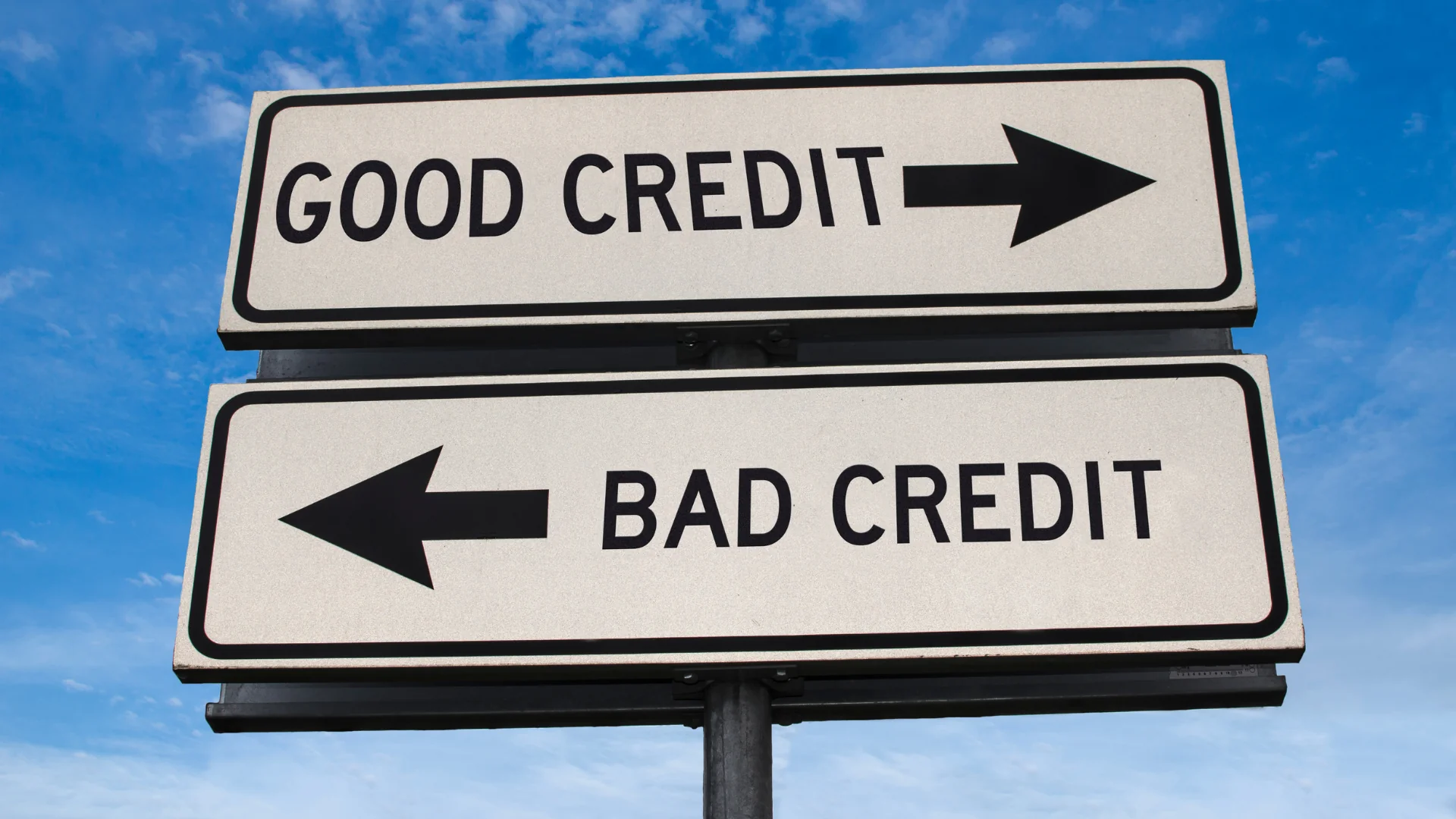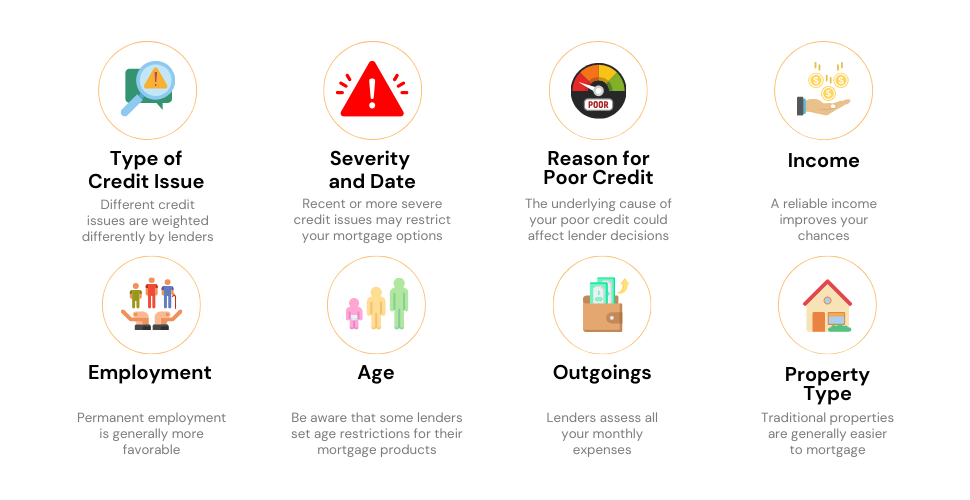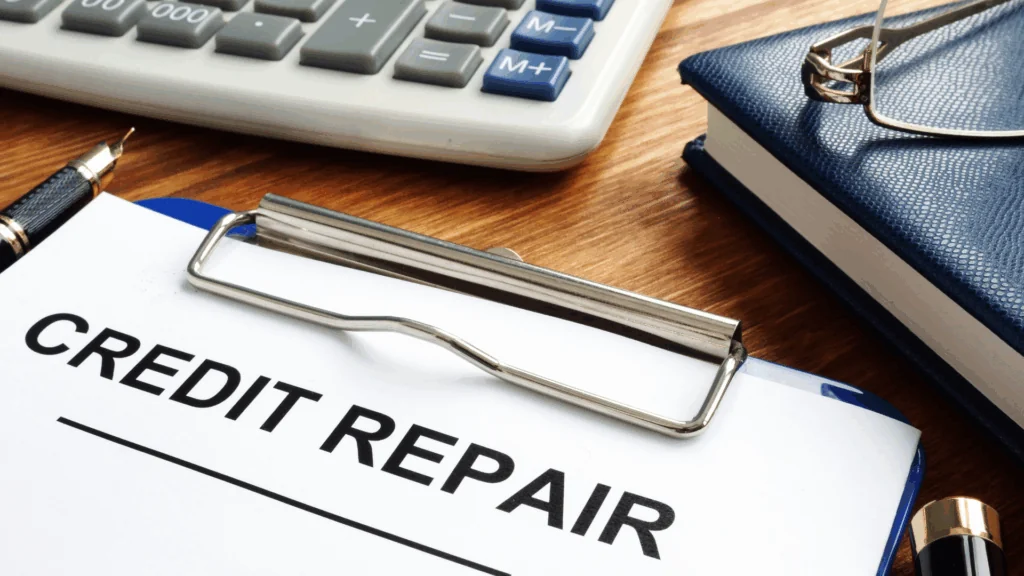- What is Bad Credit?
- Bad Credit Mortgages: An Overview
- Should I Get a Bad Credit Mortgage? The Pros and Cons
- Why Is it Hard To Get a Mortgage With Bad Credit?
- How To Get a Mortgage With Bad Credit?
- Where To Find Bad Credit Mortgage Lenders in the UK?
- Eligibility Criteria for Bad Credit Mortgages
- What is the Impact of Bad Credit on Your Mortgage Costs?
- How Much Deposit Do I Need for Bad Credit Mortgages?
- Documents Needed for a Mortgage Application
- Mortgage Opportunities for First-Time Buyers With Bad Credit
- Mortgage Options for Over 50s With Bad Credit
- Self-Employed Mortgages With Bad Credit
- Key Worker Mortgages With Bad Credit
- Remortgaging With Bad Credit
- Key Takeaways
- The Bottom Line: Your Guiding Hand
How To Get Bad Credit Mortgages in the UK: A Complete Guide

Having bad credit can feel like a brick wall on your path to owning a home. But guess what?
It’s more like a hurdle you can leap over. Bad credit doesn’t necessarily mean ‘no mortgage’.
Indeed, the waters are a bit more turbulent – you might face higher interest rates, perhaps a demand for a more substantial deposit – but there are lifelines available.
This guide will offer you a lifeline and expert advice on securing a mortgage, even with a poor credit score.
What is Bad Credit?
A simple way to understand bad credit is to view it as a low score on your financial report card. This score, or credit rating, gives a snapshot of your past behaviours with borrowed money.
It’s determined by agencies known as Credit Reference Agencies (CRAs). In the UK, there are three primary CRAs – Experian, Equifax, and TransUnion. They look at factors like:
- Payment history: Have you paid past credit on time?
- Debt level: How much money do you currently owe?
- Credit length: How long have you been using credit?
- New credit applications: How often do you apply for new credit?
Each agency has its scoring system, so your credit score can vary between them. Your score can go from 0-999.
So you’ve got a better idea of how these scores work, here’s a table that shows the different ranges in the UK:
| Credit Status | Experian | Equifax | TransUnion |
|---|---|---|---|
| Excellent | 961-999 | 811-1000 | 781 – 850 |
| Very Good | – | 671-810 | – |
| Good | 881-960 | 531-670 | 721 – 780 |
| Fair | 721-880 | 439-530 | 661 – 720 |
| Poor | 561-720 | 0-438 | 601 – 660 |
| Very Poor | 0-560 | – | 300-600 |
A lower score means bad credit, making it harder to get approved for new credit, including mortgages.
Bad Credit Mortgages: An Overview
Bad credit mortgages, also known as subprime mortgages or adverse credit mortgages, are designed for those struggling with a poor credit history.
As a rule of thumb, these mortgages might come with higher interest rates or require a larger deposit.
But remember, they allow getting onto the property ladder or securing a home loan when the mainstream lenders won’t budge.
Bad credit doesn’t necessarily mean you’ll face outright rejection. You can still get a mortgage from specialist lenders.
They will consider each situation individually, looking at factors such as:
- The age, severity, and cause of the credit issue
- The likelihood of the issue happening again
It’s important to note that different lenders have different criteria, and some may offer a mortgage despite past financial difficulties such as:
- Missed payments
- Exceeding your agreed credit limit or overdraft
- Defaults
- County Court Judgments (CCJs)
- Individual Voluntary Arrangement (IVA), or
- Sharing an account with someone who has debt problems
- Debt management plans
- Bankruptcy
That said, it’s crucial to be realistic about the potential costs involved and ensure you can comfortably afford the mortgage repayments. Overextending your finances could lead to more severe issues down the line.
Should I Get a Bad Credit Mortgage? The Pros and Cons
A bad credit mortgage could be an option for you, but it’s important to weigh its benefits and drawbacks.
Pros
- Homeownership. You can get on the property ladder sooner.
- Interest rates. Secure a mortgage before future rate increases.
- Current prices. Buy at today’s house prices before they potentially rise.
- Future deals. There’s a possibility to remortgage at better terms as your score improves.
Cons
- Larger deposit. You might need to save more for your deposit.
- High interest. You could face steeper interest rates, raising the overall cost.
- Limited options. Your choice of mortgages may be less diverse.
- Credit score risk. Being turned down may further lower your score. This is because some lenders may do a ‘hard search’ on your credit, which could hurt your credit score.
Every financial situation is unique, and it’s important to make an informed decision. Consider all these factors and, if needed, seek advice from a professional. After all, buying a house is a significant financial commitment.
Why Is it Hard To Get a Mortgage With Bad Credit?
It’s a simple matter of risk – if your credit report suggests that you’ve had difficulty repaying borrowed funds in the past, lenders might view you as a higher-risk prospect.
The fallout? A potential mortgage offer that comes with higher interest rates or requires a bigger deposit.
But, it’s important not to be disheartened. Some lending avenues and mortgage types cater specifically to those with poor credit scores.
Plus, remember that bad credit isn’t a life sentence. There are effective ways to improve your credit score and boost your chances of securing a mortgage.
In the forthcoming sections, we will delve deeper into these opportunities and equip you with actionable tips to aid your quest for a mortgage, irrespective of your credit score.

How To Get a Mortgage With Bad Credit?
Here are some key steps to help you on your journey:
Getting a bad credit mortgage isn’t wildly different from a standard one, but there are a few extra hoops to jump through.
Don’t worry—it’s totally doable. Follow these steps to boost your chances:
1. Boost Your Financial Fitness
First things first—tidy up your finances. If you’ve got lingering debts, try to pay them off (even small steps count).
Keep up with regular payments, and make sure you’ve got a steady, reliable income coming in. Think of it as prepping your finances for their moment in the spotlight.
2. Get to Know Your Credit Record
Your credit report is like your financial CV, and it’s worth knowing exactly what’s in it.
You can grab a free copy from credit reference agencies (CRAs) like Experian, Equifax, and TransUnion.
Use free tools to keep tabs on your scores with all three agencies. It’s a bit like checking the weather—just with fewer surprises! If you spot mistakes, get in touch with the CRA to fix them.
And if you’re still financially linked to an ex or an old flatmate, ask the agency to cut those ties (assuming the accounts are closed).
3. Spruce Up Your Credit Score
Even small tweaks can make a difference.
Pay your bills on time, get on the electoral roll (it’s free and easy), and hold off on applying for new credit for a bit. Little wins can add up faster than you’d think.
4. Save for a Bigger Deposit
The bigger your deposit, the happier lenders will be to consider you. For a standard mortgage, you’d typically need a deposit of around 5–10% of the property’s value.
But with a bad credit mortgage, lenders may ask for a chunkier deposit—often between 15–30%. It’s their way of balancing out the extra risk.
So, aim to save as much as possible—think of it as giving yourself extra brownie points with lenders. Plus, a bigger deposit could mean snagging better rates.
5. Make Your Rent Payments Work for You
Been renting? Good news—some CRAs now count regular rent payments when calculating your credit score.
It’s like getting credit for what you’re already doing! Make sure your rent is being reported to the agencies that offer this service.
6. Lean on Family for Support
Sometimes, a little family help can go a long way. They could ‘gift’ you part of your deposit, act as a guarantor, or even join in on a joint mortgage.
Just be sure to chat everything through first—money and family can be a tricky combo!
7. Work With a Specialist Broker
A good specialist broker who knows the ropes with bad credit mortgages can be a real lifesaver. They’ll have access to lenders who are more open to your situation and can guide you through the process like a pro.
They can help you get an Agreement in Principle (AIP), so you know how much you’re likely to borrow before you start your property search.
Your broker can also assist with sorting out all the necessary documents—like proof of income and bank statements—making the whole process much smoother.
Plus, they’ll connect you with lenders who are more likely to approve your application, saving you time and reducing the chances of rejection.
Just keep in mind, while a broker can work wonders, they can’t guarantee approval—it still depends on your finances, mortgage availability, and whether you meet the lender’s requirements.

Where To Find Bad Credit Mortgage Lenders in the UK?
Finding the right lender when you have bad credit is a bit like finding a needle in a haystack. It’s not impossible, but it does require some patience and perseverance.
Mainstream lenders may be wary of lending to individuals with lower credit scores, but that’s not the end of the road.
In the UK, some of the lenders that offer bad credit mortgages are:
- Aldermore
- Barclays
- Bluestone
- Halifax
- Pepper Money
- Precise Mortgages
- Royal Bank of Scotland
- Santander
- Vida Homeloans
Note that these lenders will review your application individually. There’s no guarantee of securing a mortgage, even if you apply to these specific lenders.
Also, it’s worth pointing out that this isn’t a comprehensive list. With over 100 lenders in play, each with unique criteria relating to bad credit, there’s a lot more to consider.
This list also falls short of including specialist lenders who cater specifically to bad credit mortgages.
To get a quick snapshot of available deals, you can use online comparison tools. But, bear in mind that these tools might not paint the complete picture.
Teaming up with a good mortgage broker can be a game changer. They have access to a broader range of lenders and can give tailored advice based on your unique circumstances.
Eligibility Criteria for Bad Credit Mortgages
When assessing eligibility for bad credit mortgages, lenders consider various factors. Here’s what they look for:
- Type of credit issue. Different issues carry different weights. Late payments, for instance, are less severe than bankruptcy.
- Severity and date of the issue. More recent issues, or severe issues like bankruptcy or repossession, may require more explanation and could limit your options.
- Reason for poor credit. Lenders may consider the reason behind your poor credit. Circumstances like job loss due to illness are viewed differently than just poor money management.
In addition, lenders also look at:
- Income. A steady income can make you more attractive to lenders.
- Employment. Permanent employment is preferred by most lenders.
- Age. Lenders may have age limits for their mortgage products.
- Outgoings. All your regular expenses, such as loan repayments or bills, are considered.
- Property type. Some properties are considered riskier than others. A standard brick and tile house is often easier to mortgage.

What is the Impact of Bad Credit on Your Mortgage Costs?
When your credit isn’t in the best shape, it can have a profound effect on the cost of your mortgage.
Typically, lenders perceive applicants with bad credit as higher risk, which leads to increased costs to offset this risk.
Interest Rates
The first impact is on your interest rates. The riskier a lender perceives you, the higher the interest rate you’re likely to be offered.
This means that over the lifetime of your mortgage, you could end up paying significantly more compared to someone with a better credit score.
Fees
Additional costs often come in the form of higher upfront fees. Lenders may charge a higher product fee, or they might require you to pay for mortgage insurance, which safeguards the lender if you default on your loan.
Here’s a simplified table that gives an idea of the potential costs involved:
| Credit Status | Approx. Initial Interest Rates | Typical Fees |
|---|---|---|
| Excellent | 2-3% | Low |
| Good | 3-4% | Medium |
| Poor | 5-6% | High |
Remember, these figures are just estimates. The actual rates and fees you’ll be offered will depend on a variety of factors, including the size of your deposit and the specifics of your credit history.
How Much Deposit Do I Need for Bad Credit Mortgages?
As mentioned earlier, those with poor credit history might be expected to provide a larger deposit for a mortgage. This is simply because lenders want to minimise their risk.
The larger the deposit, the smaller the loan, and therefore, the less risk for the lender.
Generally, a deposit of around 15% to 30% of the property value might be expected if you have a history of adverse credit. But, the exact amount varies widely between lenders and circumstances.
Documents Needed for a Mortgage Application
When applying for a mortgage, you need to have certain documents ready. Having these documents prepared can make the process smoother and faster. These typically include:
- Payslips, and P60 forms to prove your income
- Bank statements to prove your deposit
- ID documents such as a passport, driver’s licence, or other government-issued ID.
- Proof of address such as utility bills
- Details of any outstanding debts: This could be your credit card statements or loan agreements
If you’ve had credit issues, you may need to give further details, such as:
- Bankruptcy discharge details, if applicable
- Details of any County Court Judgements (CCJs)
Mortgage Opportunities for First-Time Buyers With Bad Credit
Taking that first step onto the property ladder can seem like a daunting task, especially for first-time buyers with bad credit.
Traditional high street lenders might turn a blind eye due to the perceived risks associated with lending to someone with a shaky credit history.
But that’s not the end of the journey. A range of specialist lenders are willing to consider a broader picture.
They understand that everyone’s situation is unique and that adverse events, such as missed payments, late payments, CCJs, IVAs, debt relief orders, bankruptcy, or simply having a low credit score, shouldn’t shut the door on homeownership.
Mortgage Options for Over 50s With Bad Credit
Borrowers over 50 might be met with resistance from some lenders, particularly if they also have bad credit.
This is largely due to the lenders’ perception of risk, especially when considering the borrower’s retirement age and expected decrease in income.
But, there are alternatives. Some lenders take a more holistic view.
They may consider stable incomes from investments, pensions, self-employment, and even part-time or full-time employment. They look at overall affordability, not just age and credit history.
Self-Employed Mortgages With Bad Credit
Being self-employed with a bad credit score might feel like a double setback when applying for a mortgage.
Despite some lenders viewing you as a higher risk, there are lenders who are more understanding.
If you face severe credit issues such as recent CCJs, IVAs, or bankruptcy, seeking professional advice from a good mortgage broker can be invaluable. They can help identify lenders more likely to consider your application based on your unique circumstances.
Still, there’s no guarantee of success. Your options will depend on factors like your financial position, the seriousness of your credit issues, and what each lender is looking for.
When applying, you’ll need to prove your income, and that’s where your self-assessment tax return comes in handy. You can download your SA302 form from HMRC and use it as proof of income for lenders.
Key Worker Mortgages With Bad Credit
As a key worker with a low credit score, you have access to specific mortgage options. These options recognise the essential nature of your role and strive to make homeownership more achievable.
One such option is the First Homes Programme, which offers houses at a minimum of 30% to 50% below market value.
This scheme allows eligible first-time buyers and key workers to purchase a home at an accessible price.
But, the first sale cannot exceed £250,000 (£420,000 in Greater London), and the discounted rate carries forward to any future sales.
Another beneficial scheme is the Right to Buy. This programme enables qualifying council tenants to buy their council houses at a discounted rate.
While these are excellent options, adverse credit situations like recent council debt, a CCJ, or bankruptcy may still pose challenges.
Specialist mortgage brokers can help by connecting you with lenders that might accommodate your circumstances.
Remortgaging With Bad Credit
Remortgaging when you’ve got bad credit can be tricky, but it’s definitely not out of reach. It just takes a bit more planning to get it right.
Whether you’re after a better interest rate, release equity from your home, or combine your debts into one payment, your approach will depend on your goals.
Your current lender might be a good place to start. They may offer a deal that lets you switch products without needing a full credit check, which could save some hassle.
Plus, the amount of equity you’ve built up in your home can make a big difference.
The more equity you have, the less of a risk you appear to lenders, even if your credit history isn’t spotless.
That said, remortgaging with bad credit can still have its challenges.
Even with help from a specialist broker, you might not find the perfect deal. It all depends on your finances, what lenders are willing to offer, and whether you meet their requirements.
But it’s worth exploring, as options might be better than you think.
Consolidating Debt With a Bad Credit Remortgage
Remortgaging to consolidate debt can be a practical solution for homeowners with bad credit.
This process allows you to replace your current mortgage with a new one, and then utilise any surplus to pay off existing debts.
The big win is having one monthly repayment, instead of several to different lenders. You’ll be dealing with one creditor – your mortgage lender – which can simplify your financial situation.
Sometimes, the remortgage interest rate might even be lower than other debts, cutting your monthly costs.
But, consider the long-term implications. Even with poor credit, don’t rush into settling for less.
By consolidating debts into your mortgage, you’re spreading them over a more extended period.
This could result in a lower monthly payment but potentially a higher total amount repaid over time due to the longevity of the debt.
Key Takeaways
- Bad credit mortgages are for people with low credit scores. They often come with higher interest rates and need bigger deposits but can help you buy a home when mainstream lenders say no.
- Lenders look at more than your credit score, including how serious and recent your credit issues are, your income, spending habits, and financial situation.
- You can improve your chances by fixing your credit score, saving a bigger deposit, and using a specialist broker who knows how to find lenders that may accept you.
- Schemes like First Homes and Right to Buy can help key workers and first-time buyers afford a home, even with bad credit.
- Remortgaging with bad credit is possible but can involve higher costs, fewer options, and no guarantees of approval.
The Bottom Line: Your Guiding Hand
When bad credit threatens your dream of owning a home, a good mortgage broker steps in. These experts have their finger on the pulse of the lending market, aware of lenders who are more lenient with credit hiccups.
They guide you, advise you, and ultimately, help secure that much-coveted mortgage. But, it’s not just about getting the mortgage; it’s about getting one you can afford.
To take advantage of this, reach out to us today. We will match you with a seasoned mortgage broker to help you in your mortgage journey.
Get Matched With Your Dream Mortgage Advisor...

Frequently asked questions
Can I get a mortgage in principle with bad credit?
Yes, even with bad credit, it’s possible to get a mortgage in principle, but it might be more difficult.
Is it possible to get a mortgage with bad credit UK?
Yes, there are lenders in the UK who specialise in providing mortgages to those with bad credit.
What is the lowest credit score accepted for a mortgage?
This varies between lenders, but even those with low credit scores may find suitable options with specialised lenders.
This article has been fact checked
This article was created, checked, and verified by the expert team at Money Saving Guru. Trust us, you’re in good hands.




